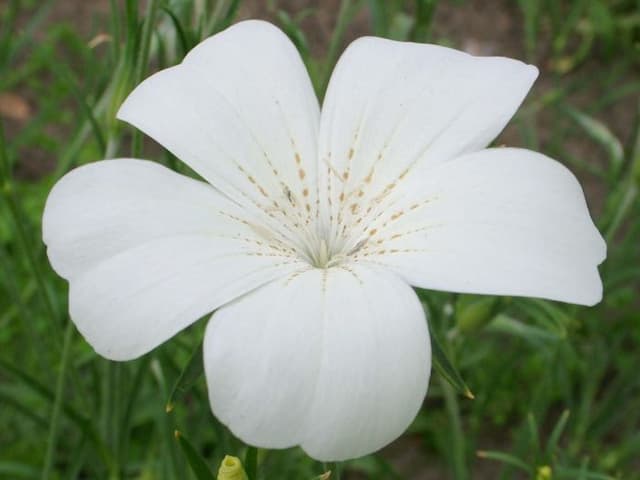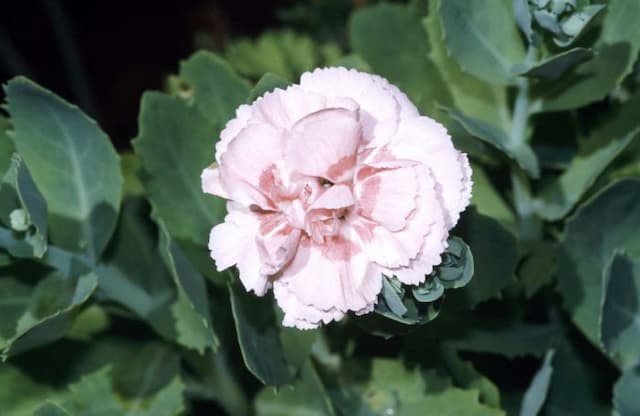Cheddar Pink Dianthus 'Devon Wizard' (p)

ABOUT
The Dianthus 'Devon Wizard', also simply known as Cottage Pinks, is a visually striking plant with distinctive features. It possesses a mound of narrow, green to blue-green foliage that forms a dense and bushy appearance. The leaves are typically slender and may have a slightly glaucous appearance, providing a lovely contrast against the vibrancy of the flowers. The flowers of the 'Devon Wizard' are particularly noteworthy for their beauty. They are large and often display a frilly or serrated edge, exuding a charm that is reminiscent of traditional cottage gardens. Each bloom boldly showcases a rich magenta or deep pink color with a striking, often lighter, eye in the center, which makes them stand out in the garden. These blooms are arrayed in a clustered fashion atop sturdy stems that rise above the foliage, creating an eye-catching display. Additionally, the flowers give off a delightful fragrance, which can add a layer of sensory enjoyment to the garden. This sweet scent is characteristic of many members of the Cottage Pinks family and makes them a favorite for planting in areas where they can be easily admired up close. Overall, the visual appeal of the Dianthus 'Devon Wizard' lies in its lush foliage and showy, fragrant flowers, which can be a stunning addition to garden borders, rockeries, or as part of floral arrangements when cut for indoor enjoyment.
About this plant
 Names
NamesSynonyms
Cheddar Pink, Devon Wizard Pink
Common names
Dianthus 'Devon Wizard'
 Toxicity
ToxicityTo humans
The Dianthus 'Devon Wizard', commonly known as the Pinks, is not considered toxic to humans. Generally, if ingested, this plant does not cause poisoning or produce harmful symptoms. However, individual sensitivities can vary, and it is always advised to prevent the ingestion of any plant material not meant for consumption, as it could potentially cause mild stomach upset. There are no significant toxic consequences reported from ingesting Pinks.
To pets
The Pinks, the common name for Dianthus 'Devon Wizard', is not known to be toxic to pets. It should not cause any significant symptoms of poisoning in animals if ingested. As with humans, individual animals may have sensitivities or allergies, and the ingestion of non-food plants could result in mild gastrointestinal upset, but no serious toxic effects are expected for pets from consuming parts of this plant.
 Characteristics
CharacteristicsLife cycle
Perennials
Foliage type
Evergreen
Color of leaves
Blue-green
Flower color
Pink
Height
1 feet 2 inches (35 cm)
Spread
1 feet (30 cm)
Plant type
Herb
Hardiness zones
7
Native area
Europe
Benefits
 General Benefits
General Benefits- Aesthetic Appeal: Adds vibrant color and texture to gardens with its bright pink-purple flowers.
- Fragrance: Emits a sweet, clove-like scent that can enhance the sensory experience of a garden.
- Long Blooming: Offers a lengthy blooming season, providing flowers from late spring to early fall.
- Attracts Beneficial Insects: Draws in pollinators such as bees and butterflies, promoting biodiversity.
- Drought Tolerance: Capable of withstanding periods of low water once established, making it suitable for xeriscaping.
- Low Maintenance: Requires minimal care beyond initial establishment, making it appealing for novice gardeners.
- Versatility: Suitable for a variety of garden settings, such as borders, rock gardens, and containers.
- Cold Hardy: Can survive in cooler climates, making it a robust choice for temperate gardens.
- Deer Resistance: Generally not preferred by deer, which helps prevent damage to the plant and garden.
- Cut Flowers: Suitable for use in bouquets and flower arrangements due to their attractive appearance and fragrance.
 Medical Properties
Medical PropertiesThis plant is not used for medical purposes.
 Air-purifying Qualities
Air-purifying QualitiesThis plant is not specifically known for air purifying qualities.
 Other Uses
Other Uses- Edging for Garden Paths: Garden pinks, including Devon Wizard, create beautiful, low borders along pathways, with their dense foliage and striking flowers enhancing the garden's structure.
- Creating Scented Garlands: The fragrant blooms of the garden pink can be strung into garlands to provide a natural perfume for outdoor gatherings or even for use indoors in a vase of water to preserve them longer.
- Fragrant Drawer Sachets: Dried garden pink petals can be placed into small cloth sachets and tucked into drawers or closets to impart a mild, pleasing scent to linens and clothing.
- Garden Pink Potpourri: The flowers can be dried and mixed with other complimentary botanicals to make a fragrant potpourri that freshens up living spaces.
- Cake Decoration: The non-toxic blooms of Devon Wizard can be used as edible decorations on cakes and desserts, adding a splash of color and subtle flavor.
- Floral Ice Cubes: Petals of the garden pink can be frozen within ice cubes to create an attractive and edible element to summer beverages.
- Natural Dye: The pigment of the flowers can provide a natural dye for fabrics or crafting projects, delivering subtle hues when used properly.
- Companion Planting: Garden pinks can deter some pests and attract beneficial insects when planted among vegetables and other plants, promoting a healthier garden ecosystem.
- Photography Prop: The vibrant flowers and distinctive eye of the Devon Wizard make an excellent subject for botanical photographers and hobbyists looking to add color to their portfolio.
- Culinary Garnish: Fresh garden pink petals can be sprinkled over salads or used to adorn cocktails, offering a decorative touch with a hint of spice.
Interesting Facts
 Feng Shui
Feng ShuiThe Carnation is not used in Feng Shui practice.
 Zodiac Sign Compitability
Zodiac Sign CompitabilityThe Carnation is not used in astrology practice.
 Plant Symbolism
Plant Symbolism- Love: Dianthus flowers are often associated with love and affection, making them a popular choice for romantic gestures.
- Admiration: Giving someone a bouquet of dianthus can symbolize deep admiration and respect for the person.
- Purity: The bright and clean appearance of the Dianthus 'Devon Wizard' may represent purity and innocence.
- Boldness: The vibrant colors and assertive fragrance of the plant are often seen as a symbol of boldness and challenge to the status quo.
- Devotion: Due to their long-lasting nature, dianthus flowers can also represent commitment and enduring devotion in relationships.
 Water
WaterThe Cheddar Pinks should be watered deeply but infrequently to encourage deep root development. It's best to water these plants when the top inch of soil feels dry to the touch. Depending on the climate and weather conditions, this might translate to about 1 inch of water every week to ten days. Always avoid overhead watering to prevent disease, and instead, water at the base of the plant. During prolonged dry spells, a weekly watering of approximately half a gallon per square foot should suffice.
 Light
LightCheddar Pinks thrive in full sunlight conditions, meaning they should receive at least 6 hours of direct sun per day. The ideal spot for these plants is in an area that receives ample morning sunlight and protection from the intense heat of late afternoon sun, especially in hotter climates.
 Temperature
TemperatureCheddar Pinks prefer moderate to cool temperatures and will flourish in environments where the temperatures range from 40°F to 85°F. They can tolerate frosts down to about 20°F but may suffer if the temperature dips lower. The ideal growing temperature for these flowers is between 60°F and 70°F.
 Pruning
PruningCheddar Pinks benefit from pruning to promote bushy growth and abundant flowering. Deadhead spent flowers regularly to encourage more blooms. After the blooming season, trim back about one-third of the plant's height to maintain shape and vigor. The best time for a major prune is early spring or just after the main flowering period.
 Cleaning
CleaningAs needed
 Soil
SoilPinks, such as Dianthus 'Devon Wizard', require well-draining soil with a neutral to slightly alkaline pH, between 6.7 and 7.5. A good soil mix for pinks can be created with one-third garden soil, one-third sharp sand or grit, and one-third well-rotted compost or fine bark. This combination ensures proper drainage while providing enough organic matter for nutrients.
 Repotting
RepottingPinks (Dianthus 'Devon Wizard') should be repotted every 2-3 years to refresh the soil and to accommodate the plant's growth. The best time for repotting is in the spring before new growth begins, allowing the plant to establish in its new container prior to blooming.
 Humidity & Misting
Humidity & MistingPinks, including Dianthus 'Devon Wizard', are tolerant of a wide range of humidity levels and do well in average ambient humidity. They prefer not to be too damp and need good air circulation to prevent issues with excessive moisture.
 Suitable locations
Suitable locationsIndoor
Place in bright light and well-draining soil.
Outdoor
Full sun, well-drained soil, space 30cm apart.
Hardiness zone
4-9 USDA
 Life cycle
Life cycleThe Dianthus 'Devon Wizard', commonly known as Cheddar Pink, begins its life cycle with seed germination, requiring well-draining soil and some light exposure to trigger growth. Once sprouted, it enters the vegetative stage, developing a clump of slender, blue-green leaves and sturdy stems typically in spring or early summer. Transitioning to the flowering phase, Cheddar Pink produces fragrant, fringed flowers in shades of pink or purple in late spring to early summer, which attract pollinators such as bees and butterflies. After pollination occurs, the plant sets seed in the form of a capsule, ensuring the potential for reproduction. As an herbaceous perennial, Cheddar Pink will die back to the ground in late autumn after frost, entering a period of dormancy over winter, then regrow from its crown the following spring. With proper care and favorable conditions, this cycle can continue for several years, with the plant potentially spreading through self-seeding or vegetative propagation by division of the root clump in early spring or fall.
 Propogation
PropogationPropogation time
Early Spring
The Dianthus 'Devon Wizard', also known as Pinks, is most commonly propagated through softwood cuttings. This method is typically performed during late spring or early summer when the plant's growth is most active. To propagate, a gardener would select healthy, non-flowering stems and cut a piece about 4 to 6 inches long. The lower leaves are removed, and the cut end is often dipped in rooting hormone to encourage root development. The cutting is then planted in a well-draining soil mix and kept in a warm, humid environment until roots have developed, which usually takes several weeks. It's important to maintain even moisture during this period without overwatering, which can lead to rot. Once the cuttings have rooted, they can be transplanted into individual pots or directly to the desired location in the garden.








![Pink [Bubblegum]](/_next/image?url=https%3A%2F%2Fplants-admin.emdemapps.com%2Fimages%2Fplants%2F%2Fimages%2F604b596f31cbb.png&w=640&q=75)
